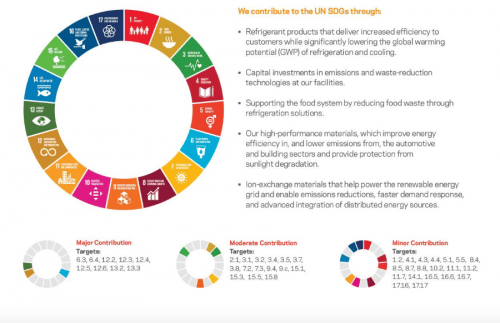The Chemours Company (CC.NYSE) announced the extension of its Future of Chemistry Scholarship program through the year 2030 today.
Corporate social responsibility seems like a misnomer, doesn’t it? The stratagem is like the child who’s about to get caught doing something that would draw his parents displeasure, who then will be excessively sweet to deflect away from the crime.
“This decade-long commitment to students in the Wilmington area is a salute to the talented youth in this city. They are both an important investment in our future and the embodiment of our commitment to the city and state we call home. We believe that a career in STEM should be accessible to everyone, which is why we’re working to engage a broader base of students through meaningful partnerships that help us meet our goal of building more vibrant communities,” said Mark Vergnano, president and chief executive officer of Chemours.
Doesn’t it sound like a load of hot air?
Here’s what investopedia has to say about social responsibility:
Companies are increasingly ramping up their focus on social responsibility, whether its championing women’s rights, protecting the environment, or attempting to obliterate poverty, on local, national, or global levels. From an optics perspective, socially responsible companies project more attractive images to both consumers and shareholders alike, which serves to positively affect their bottom lines.
The definition seems incomplete without adding something about whitewashing, but more on that later.
So what is Chemours?
They’re a 2015 spin-off of the DuPont chemical company prior to its merger with Dow Chemical. They’re involved in the manufacturer and sale of performance chemicals, such as Titanium Technologies (titanium dioxide); Fluoroproducts (refrigerants and industrial fluoropolymer resins and derivatives including Freon, Teflon, Viton, Nafion, and Krytox); and Chemical Solutions (cyanide, sulfuric acid, aniline, methylamines, and reactive metals).
Their scholarship involves the City of Wilmington and its HBCU Week initiative. The scholarships support Wilmington-area students pursuing science, technology, engineering, or mathematics (STEM) degrees at historically black colleges and universities (HBCUs).
The program extends through 2030, and it’s part of Chemours’ broader Corporate Responsibility Commitments.
Here’s a helpful infographic:

So what’s the real story?
Finding out what they’re being sued for is usually the first step.
The Complaint alleges that, throughout the Class Period, Defendants misled investors by representing that Chemours had appropriately accounted and accrued reserves for its environmental liabilities, that the possibility of costs exceeding accrued amounts was “remote,” and that, in any event, additional costs would not be material.
Alright, so Chemour didn’t make good on a promise and their environmental accountability measures cost a bit more than they were saying. That’s unfortunate.
Wait. What’s this? There’s more.
Chemours also assured investors that its “policies, standards and procedures are properly designed to prevent unreasonable risk of harm to people and the environment,” and that its “handling, manufacture, use and disposal of hazardous substances are in accordance with applicable environmental laws and regulations.” As a result of these misrepresentations, Chemours shares traded at artificially inflated prices throughout the Class Period.
Oh. That’s considerably worse. The stock price is down because Chemours and DuPont’s products have (allegedly) been slowly killing people for decades.
That chemical in Teflon and Tefal pots that disappears the first time you accidentally use anything harder than a damp rag? The one the company that sold it to you swore up and down isn’t harmful or toxic? Yeah. It’s toxic.
The offending chemicals, called polyfluoroalkyl substances (PFAS), are found in non-stick pans, water-resistant clothes, food packaging and firefighting foam. They’re called “forever chemicals” because they do not break down in the environment and accrue naturally in the human body. Studies have linked these forever chemicals to cancer, thyroid problems and developmental issues in children.
Most people are exposed through their drinking water. PFAS have polluted the tap water of at least 16 million people in 33 states and Puerto Rico, as well as groundwater in at least 38 states. Tap water contamination is probably worse, though, because the studies often don’t include private wells.
In 2016, researchers discovered troubling levels of GenX in North Carolina’s Cape Fear River. The source was a PFAS manufacturing plant owned by The Chemours Company, a spin-off of DuPont.
Last month, DuPont, The Chemours Company and The 3M Company got a chance to bake in the senate spotlight over their environmental records. Naturally, they denied responsibility for a category of toxic fluorinated chemicals that have contaminated water supplies around the US and are now found in the bodies of nearly all Americans.
Here’s what the FDA has to say:
Accumulation of certain PFAS has also been shown to occur in humans and animals, as found through blood tests. While the science surrounding potential health effects of PFAS is developing, current evidence suggests that the bioaccumulation of certain PFAS may cause serious health conditions.
So the bad news is that most of what we’ve taken for granted for so long as safe has been killing us slowly for decades.
The good news is you now that know if a company is doing something good for the community, they’re either trying to build a brand perspective that will bolster their bottom line, or there’s a good chance they’re covering up for something.
Look deeper and never relieve your skepticism.
—Joseph Morton

